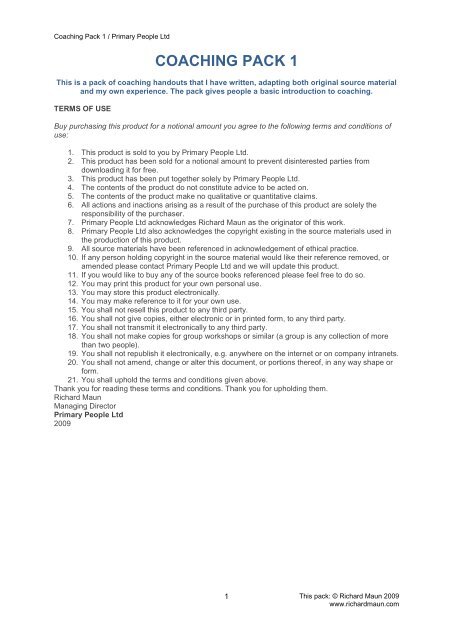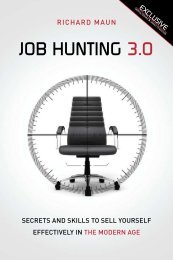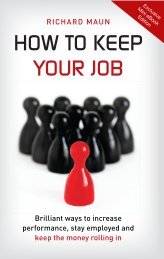View Sample Product - Richard Maun
View Sample Product - Richard Maun
View Sample Product - Richard Maun
You also want an ePaper? Increase the reach of your titles
YUMPU automatically turns print PDFs into web optimized ePapers that Google loves.
Coaching Pack 1 / Primary People LtdCOACHING PACK 1This is a pack of coaching handouts that I have written, adapting both original source materialand my own experience. The pack gives people a basic introduction to coaching.TERMS OF USEBuy purchasing this product for a notional amount you agree to the following terms and conditions ofuse:1. This product is sold to you by Primary People Ltd.2. This product has been sold for a notional amount to prevent disinterested parties fromdownloading it for free.3. This product has been put together solely by Primary People Ltd.4. The contents of the product do not constitute advice to be acted on.5. The contents of the product make no qualitative or quantitative claims.6. All actions and inactions arising as a result of the purchase of this product are solely theresponsibility of the purchaser.7. Primary People Ltd acknowledges <strong>Richard</strong> <strong>Maun</strong> as the originator of this work.8. Primary People Ltd also acknowledges the copyright existing in the source materials used inthe production of this product.9. All source materials have been referenced in acknowledgement of ethical practice.10. If any person holding copyright in the source material would like their reference removed, oramended please contact Primary People Ltd and we will update this product.11. If you would like to buy any of the source books referenced please feel free to do so.12. You may print this product for your own personal use.13. You may store this product electronically.14. You may make reference to it for your own use.15. You shall not resell this product to any third party.16. You shall not give copies, either electronic or in printed form, to any third party.17. You shall not transmit it electronically to any third party.18. You shall not make copies for group workshops or similar (a group is any collection of morethan two people).19. You shall not republish it electronically, e.g. anywhere on the internet or on company intranets.20. You shall not amend, change or alter this document, or portions thereof, in any way shape orform.21. You shall uphold the terms and conditions given above.Thank you for reading these terms and conditions. Thank you for upholding them.<strong>Richard</strong> <strong>Maun</strong>Managing DirectorPrimary People Ltd20091This pack: © <strong>Richard</strong> <strong>Maun</strong> 2009www.richardmaun.com
Coaching Pack 1 / Primary People LtdCOACHING OVERVIEW1. BACKGROUNDLEARNING CONVERSATIONSA „coaching approach‟ has become a useful management skill and leadership style. It promotespersonal development, increases the power of the individual to make choices and encourages them tobe accountable for their own actions. This approach presupposes that on most occasions the coacheehas the answer locked up inside them. Therefore, coaching is about helping people to see things forthemselves in order to enable them to design their own actions to take themselves forwards.2. WHAT IS COACHING?CoachingCoachee‟s roleCoach‟s roleThe Goal= usually 2 people in a confidential conversation (can be coach + team)= work= structured sessions with learning points and actions= working with people to help them move from Point A to Point B= talk openly + explore alternatives + venture beyond comfort zone= practice new learning between sessions= be prepared to laugh and learn= build the relationship + meet coachee‟s needs + manage the process= share appropriate how-to‟s during sessions= keep the process pragmatic + contextualised + useful= bring This structure is + a encouragement sample + only. insight to the development process= provide new angles + distinctions + frameworksso the coachee can develop new actions= be prepared to laugh and learnPlease purchase this productto see the rest of the detail.= moving people towards self-propulsion= awareness + options + spontaneity (Eric Berne)= AutonomyCoaching aims to produce1) Continuing excellent performance2) Self-managed learning and development3) Self-monitoring and adjustmentThank you.3. THE COACHING PROCESSDefine the needAgree contracts= the client maps where they are and where they would like to get to= the sponsor may provide some structure and outcomes if appropriate= mutual + respectful + lawful + achievable + recompense= include practicalities + process + personal elements= For each pair: coach - coachee / coach - sponsor / coachee - sponsorHave regular sessions = preparation + conversation + options + actions + session summaryPracticeReview= have a go at agreed actions= no such thing as „failure‟ there is only practice= has the coachee made progress?= what could be done differently?2This pack: © <strong>Richard</strong> <strong>Maun</strong> 2009www.richardmaun.com
Coaching Pack 1 / Primary People Ltd4. COACHING IS ABOUT LEARNINGThe coaching process is about learning and the coach will often need to use one of more of thefollowing to help the coachee to move:Role play situations Provide objective feedback Rehearse conversationsUnpick „failures‟Explain modelsShare top tipsShare examples2-minute brainstorming insilence with Post-It notesShare practical how-to‟s onrequested areasSome useful quotations about learning:“A mind stretched by a new idea never returns to its original dimensions.” Oliver Wendell Holmes.“An idea is a new combination of old elements”. Gordon Dryden.“Vertical thinking is digging the same hole deeper. Lateral thinking is trying again elsewhere”. Edwardde Bono.“The only dumb question is a question you don’t ask”. Paul MacCready.5. COACHING GUIDELINESThis is a sample only.Please purchase this productto see the rest of the detail.Thank you.1. Coaching is about working with people. If there is no mutually agreed contract then it canbecome a „done-to‟ process and people will only resent it.2. A coach needs to be able to set issues in a global context. Ask: What‟s the bigger picture?3. Move between the global picture and the small detail, to maintain perspective.4. Never present yourself as an expert. It will set up a situation of dependency.5. The only reality that matters is the reality of the coachee.6. Take some time to engage people because they are „always and already‟ in their situation. Agood coach joins in and finds out where they are. Achieve this by asking open questions:How are you? What‟s uppermost in you mind? What do you want us to talk about?7. Ask WHAT instead of WHY. What questions elicit why information and bypass emotionalfilters. Being asked why can „rubber-band‟ us back to a negative parent-child situation. Ask:What was your thinking behind that? What was your desired outcome?8. Ask WHEN to nail down actions. Be firm with a coachee who does not see action as anoutcome of the coaching process. Ask:When will you have three occasions you can try this out?9. Alertness to „crisis points‟ is key. High performers grasp the moment and act.Take away message: Build the relationship first and then ask what and when.Ref: Coaching, Flaherty, 1999 / The Learning Revolution, Dryden & Vos, 1999 / Alan Robertson, 20033This pack: © <strong>Richard</strong> <strong>Maun</strong> 2009www.richardmaun.com
Coaching Pack 1 / Primary People LtdCOACHING CONCERNS1. COMMON MISCONCEPTIONSMYTHS & LEGENDSCoaching is a specific and skilful part of a leader‟s tool kit. However, there are some commonmisconceptions which need to be addressed in order for people to buy-in to the process.These include:1. “Coaching is just the same as mentoring”. Although there is a natural grey area betweenthem, coaching is about working with someone to enable them to make upward progress,whereas mentoring is more about being a friend and companion. A mentor may listenpassively, whereas a coach may ask questions, challenge, or provide new angles.2. “Coaching is just talking really”. Coaching is work. It involves structured learningconversations, where both parties make a valid contribution. Coaching sessions have a startand an end and include learning points and agreed actions.3. “Coaching can help everyone”. Not always – coaching is best used for people goingthrough a period of transition. If you need help to get from Point A to Point B then coaching isa good option. However, if you wish to remain as you are, then coaching is of no use to you.This is a sample only.4. “You can‟t coach someone if you don‟t understand the technical elements of theirwork”. This is one of the most pernicious myths. Coaching in general is not based on specifictechnical knowledge. Instead it is a structured and reflective process which helps the coacheeto increase their options and design new actions.Please purchase this product5. “All coaches are the same”. No. Coaching involves building personal rapport. As with allthings in life, a coach you can‟t get on with is no use to you. Life coaches help people withto see the rest of the detail.personal situations, business coaches help people in more business oriented situations andsports coaches help people to hone specific sporting skills. These can all involve differentapproaches, for example, sports coaching may involve more „telling‟ or „directing‟.Thank you.6. “A coach is for life”. Coaching should not involve a dependant relationship. Also, coaching isnot therapy. A good coach works quickly to ensure the coachee becomes self-sufficient. Allcoaching relationships should start with an end-point in sight.7. “Quick coaching cannot be good coaching”. Coaching can last for a single session, if thathelps the client to make the progress they need. There is no law which says that things haveto take ages to be of any use, but our own prejudices encourage us to undervalue thosethings which take less time. This is a key point for people who may need coaching, but are putoff by the fear that it will have to take months to make any progress.2. PRACTICAL TIPSWhen you are trying to coach someone, ask them what their concerns are. Use the above list to helpthem understand the reality that coaching is a useful, practical and safe process. Encourage people toask questions – this is a good way to engage interest and to ensure they have a chance to put their„hidden issues‟ on the table.Take away message: Be prepared to deal with concerns and prejudices.4This pack: © <strong>Richard</strong> <strong>Maun</strong> 2009www.richardmaun.com
Coaching Pack 1 / Primary People LtdQUESTION TYPESQUESTION TYPESOBTAINING INFORMATIONWe all use questions all of the time to gather information, check our thinking and gain agreement. It isworthwhile to consider the various forms these questions can take as the answer (and its usefulness)is directly influenced by the type of question we ask and the way we ask it. When thinking aboutquestions always remember Kipling‟s „Six Serving Men‟:“How and who and what and why and where and when.”TYPE DESCRIPTION EXAMPLESOpenClosedSeeks information and clarifies.In a coaching context the moreopen questions you ask, thebetter the session will be as thistype of question invites people tothink for themselves.Forces people to choosebetween alternatives. Can beuseful to end conversations andcheck that you have reachedagreement.What do you think about that?Why is that important to you?How could you do this differently?What other options are there?When will you have this completed?Are you going to do this?Would you like to meet in the morningor the afternoon?Would you prefer tea or coffee?Have you thought about this?LeadingRedefiningBlockingSteers someone towards aparticular answer or topic. Canbe helpful when dealing withpeople who are struggling tofocus more general thoughts.This is a sample only.Please purchase this productto see the rest of the detail.Puts the problem from a differentperspective in order to overcomea poor answer or a lack ofunderstanding. Is a usefulquestion when someone isstruggling to answer a previousquestion.Thank you.Cuts across or ignores thequestion being asked and steersthe conversation in a differentdirection.Tell me about the time when you likedusing your imagination?I think that you are good at solvingproblems. Wouldn‟t you agree?When I asked about your timemanagement what I wanted to knowwas when do you update your diary?So you can‟t remember whathappened. What do you think theother driver saw after you crossed theline?Lets not worry about my timemanagement, what I want to know iswhy I was given this task in the firstplace?Thank you for asking about theaccident. The actual question is canyou help me sue the tyremanufacturer?Take away message: Use different types of question to focus the conversation.5This pack: © <strong>Richard</strong> <strong>Maun</strong> 2009www.richardmaun.com
Coaching Pack 1 / Primary People LtdCOACHING MODELCOACHING PROCESS SUMMARYLEARNING CONVERSATIONSSTAGE COMMENTS COACHING SKILLPREPARATIONSET UP SESSIONPREPARATIONSHEET &LEARNING STYLESThink about neutral spaceand privacy.Coachee to complete aheadof the session.Coach to review their ownLearning Styles and those oftheir Coachee.Learning StylesCOACHINGSESSIONCONTRACTInclude: Confidentiality,permissions, timing, notetaking, expectations.Review preparation sheetand ask what the CoacheeCURRENT This expects is a sample to have at the only. end ofSITUATION the session.Review previous actions andwhat has been practised.1) GOALS2) REALITY3) OPTIONS4) WILLINGNESSSUMMARY SHEETQUOTEIdentify the key issues.Identify what the Coacheeneeds to have at the end ofthe session.During the coachingdiscussion note down whatnew ideas or angles orthinking emerge.Generate options.List the options and considertheir viability.Sort and prioritise ACTIONS.Practice and rehearse themwhere appropriate.Check commitment.Complete and agree.Check to see if there are anylingering needs.Ask the coachee for a „quote‟to capture their feelingsabout the session.Review location and timing.ContractingPermissionsPlease purchase this productto see the rest of the detail.SET UP NEXTSESSIONTHANKThank you.Thank Coachee for their timeand their contribution.Open questionsFeedbackDisclosureReality CheckingJohari WindowThomas-KilmannEgo StatesLearning StylesDialogueBrainstormingPost-it‟s in silenceOpen questionsSMART objectivesettingDisclosure (to confirmcommitment)Role-playingReflectionProvide How-to‟sDisclosureRef: Coaching for Performance, Whitmore, 2003 / <strong>Richard</strong> <strong>Maun</strong>, 20046This pack: © <strong>Richard</strong> <strong>Maun</strong> 2009www.richardmaun.com
Coaching Pack 1 / Primary People LtdCOACHING SESSION1. COACHING SESSION STRUCTUREUSEFUL MODELSCoaching sessions involve structured conversations. The coach is responsible for managing these.When coaching, ask relevant questions from each of the four stages.STAGE The „Grow‟ Model The „Coach‟ Model The „ILpOA‟ ModelGoalsCompetencyIssues1)Relationship &Contract2)Reflection &Learning3)OptionGeneratingWhat would you like tohave by the end of thiscoaching session? (a)So your goal at workwould be what..?RealityHow much of thissituation is within yourcontrol? (c)What else bothersyou? And what else?OptionsWhat options do youhave for changingthings? (d)What would be thebenefits? What wouldyou lose?WillHow can I help you?Would you preferguidance orreassurance?What have you tried?Can you summarise theproblem in one singlesentence?So what you‟re sayingis…Share useful How-to‟sWhat are you putting upwith? (b)How much time wouldyou like for the session?What progress have youmade since we last met?Learning PointsThisOutcomesis a sample only.OptionsWhat is your timescale?SMART goals are crucialWhat have you learned?Could there be adifferent way you couldreact to this?What else could you try?What will success lookPleaselike?purchase this productto see the rest of the detail.ActionsThank you.If we had to do itdifferently, what couldwe do?What advice would yougive to someone else inthe same situation? (e)ActionsWhat are you willing totry?Which action will bringyou the most results?What would you like todo?4)Actions &Next StepsWhat will you do?When will you do this?How will you measuresuccess?What will stop you fromdoing this? (f)What is your reason forwanting to tackle it thisway?CHeckingWhat is the most difficultquestion you will face?Rehearse them orchallenge their thinkingWhen will you practice?Test assumptionsCan I have a quoteplease? (for feedback)What would we dodifferently next time?8This pack: © <strong>Richard</strong> <strong>Maun</strong> 2009www.richardmaun.com





